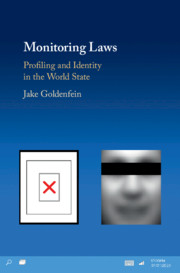Book contents
- Monitoring Laws
- Monitoring Laws
- Copyright page
- Contents
- Acknowledgements
- 1 Monitoring Laws
- 2 The Image and Institutional Identity
- 3 Images and Biometrics – Privacy and Stigmatisation
- 4 Dossiers, Behavioural Data, and Secret Speculation
- 5 Data Subject Rights and the Importance of Access
- 6 Automation, Actuarial Identity, and Law Enforcement Informatics
- 7 Algorithmic Accountability and the Statistical Legal Subject
- 8 From Photographic Image to Computer Vision
- 9 Person, Place, and Contest in the World State
- 10 Law and Legal Automation in the World State
- Index
4 - Dossiers, Behavioural Data, and Secret Speculation
Published online by Cambridge University Press: 08 November 2019
- Monitoring Laws
- Monitoring Laws
- Copyright page
- Contents
- Acknowledgements
- 1 Monitoring Laws
- 2 The Image and Institutional Identity
- 3 Images and Biometrics – Privacy and Stigmatisation
- 4 Dossiers, Behavioural Data, and Secret Speculation
- 5 Data Subject Rights and the Importance of Access
- 6 Automation, Actuarial Identity, and Law Enforcement Informatics
- 7 Algorithmic Accountability and the Statistical Legal Subject
- 8 From Photographic Image to Computer Vision
- 9 Person, Place, and Contest in the World State
- 10 Law and Legal Automation in the World State
- Index
Summary
Behavioural data collection and analysis, and the beginnings of ‘mass surveillance’, can be traced back to early intelligence surveillance and political policing. Agents would gather information from multiple sources, both trivial and salient, about individuals with no prior contact with the criminal justice system, in an effort to predict their future behaviour. Often this happened in secret, and was justified by the threat of political violence. This chapter argues that much of the political thinking and technical logics of the contemporary intelligence surveillance environment have their origin in nineteenth-century political policing. It also argues that because this information gathering and analysis occurred in secret, it produced substantial social anxiety over the potential for inaccuracy, which ultimately filtered into subsequent legal protections.
Keywords
Information
- Type
- Chapter
- Information
- Monitoring LawsProfiling and Identity in the World State, pp. 64 - 77Publisher: Cambridge University PressPrint publication year: 2019
